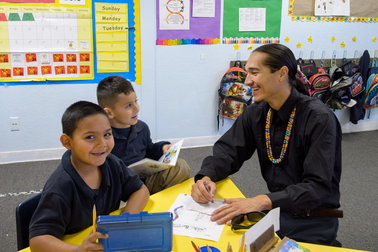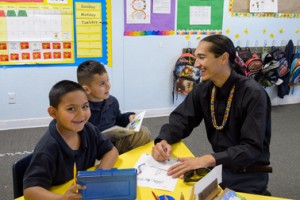Students Transform Food Trucks Into Mobile Libraries


Three enterprising ASU students, including junior Elijah Allan (right), propose converting old food trucks into new-age mobile libraries for low-income schools and communities.
Photo by: Andy DeLisle
For many of us, food trucks conjure up images of mouth-watering tacos, burgers and fries. But three enterprising Arizona State University students see food trucks and envision e-readers, computers and books, instead.
Enter BiblioTrucka, a cost-effective new-age mobile library conceived by the student trio to serve primarily low-income schools and communities lacking basic library resources. The ASU team hatched the idea of converting retired food trucks into libraries on wheels as part of their Changemaking in Education course co-taught by ASU’s Mary Lou Fulton Teachers College and Teach For America.
The course challenges students to take on real-world education challenges and then problem-solve solutions. Instead of writing a paper or taking a final, each student group is encouraged to apply for an ASU Innovation Challenge grant of up to $10,000 to implement their idea. Additionally, groups applied for funding from the Clinton Global Initiative University being hosted by former President Bill Clinton at ASU, March 21-23, 2014.
“Schools across the Valley facing a major obstacle applied to the class and made presentations to us,” said ASU senior Alex Miller, a nonprofit leadership and management major. “Jasmine, Elijah and I had all ranked library access as our top interest, so we were matched up with each other and with NFL Youth Education Town (YET) Academy in south Phoenix, which does not have a library.”
In addition to Miller, the ASU group includes Barrett Honors juniors Elijah Allan, majoring in conservation biology and ecology and minoring in American Indian studies, and Jasmine Clarke-Telfer, majoring in business urban policy and nonprofit leadership and management. NFL YET Academy is a 19-year-old charter school with a preK-12 population of 800 primarily Latino students and an “A” rating from the Arizona Department of Education for the 2012-2013 school year.
“I have a big passion for education, especially Indian education issues happening back in my Navajo Nation homeland,” Allan said. “The thing that most attracted me to this course was that you could apply for an Innovation Challenge grant and possibly get funding for your idea.”
He said the students were cognizant of the need to keep costs low in order to make BiblioTrucka affordable for low-income schools and communities. At the same time, they created a model that includes digital learning tools, books and a projector for sharing presentations and films. It also features windows, a ramp and a roll-up door for increased accessibility.
“We wanted to build our library on a food truck platform to fit in with the whole food truck movement,” Allan explained. “Our concept was to take a used food truck and renovate it to fit our mobile library idea.”
According to Chris Ford, media correspondent for the Food Network, the food truck craze is expected to swell to a staggering $2.7 billion industry by 2017. But the food expert predicted that despite the growth in dollars, the same number of food trucks that open this year will also close their businesses for good.
Having access to a library on wheels would be incredible for NFL YET and the surrounding neighborhood, said assistant principal Adam Sharp. His biggest challenge in educating NFL YET students is helping them achieve reading fluency, since a high percentage of his students speak only Spanish or have very limited English exposure, he added.
“The key to unlocking a successful life is reading fluently,” he said. “Reading is a huge component of our curriculum, especially with the new Common Core standards coming up. Challenging our kids to read proficiently by third grade is a constant point of emphasis for us.”
Sharp said the cost of constructing a school library is prohibitive and that classrooms are sorely needed for teaching students. BiblioTrucka would give NFL YET youngsters access to both technology and traditional books with numerous opportunities to boost their reading skills. The school also would share the mobile library with its mostly Spanish-speaking community, he added.
“If we’re not utilizing it here at school one day, we could take it to the Salvation Army down the street, or we could go to the McDonald’s that we partner with,” he explained. “It’s a way we could give back to the community and open it up for our neighbors to come in and read.”
Non-education major Clarke-Telfer said the changemaking course allowed her to combine her interest in education with her business focus on entrepreneurship. She said that innovative ideas like BiblioTrucka recognize America’s opportunity gap in education and try to address it.
“There are so many facets to the opportunity gap,” she explained. “Teach For America does a great job of engaging teachers, but there’s also technology, parent engagement, library access and so many other aspects to consider. With this project, we’re taking baby steps toward the long-term goal of closing that gap.”
Down the road, the students foresee the BiblioTrucka concept expanding to other charter schools without libraries, as well as the school communities. On its website, the group notes that charter schools have a harder time securing funds for resources and extra-curricular activities than do traditional schools. It also points out that Phoenix has only 13 public libraries compared to 41 public libraries in Houston, a city of comparable population size.
“The great thing about BiblioTrucka is that it can be customized to fit anyone’s needs,” Clarke-Telfer said. “Here in Phoenix we have a large Hispanic population, so we can fill it with books that speak to that community. If we go to where Elijah’s from, the Navajo Nation, we can fill it with books about their cultural ties.”
The ASU students said they hope to partner with groups like Phoenix Public Libraries and Friends of the Phoenix Public Library, as well as the Arizona State Library, Arizona Charter Schools Association, Scholastic, Inc. and ASU to help make BiblioTrucka a reality.
Judy Crawford, judy.crawford@asu.edu
480-965-4821
Media Relations














